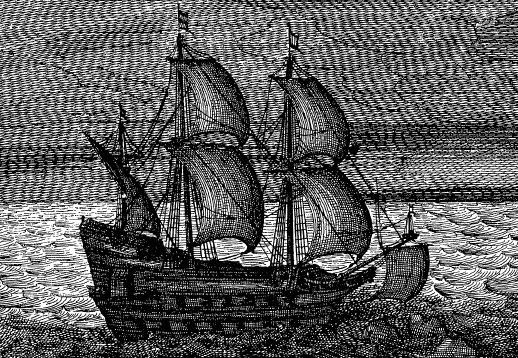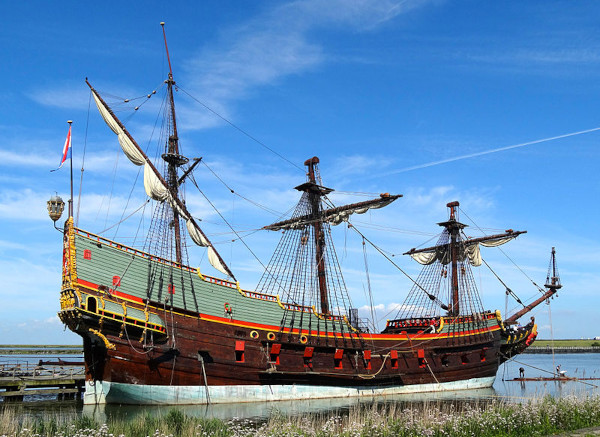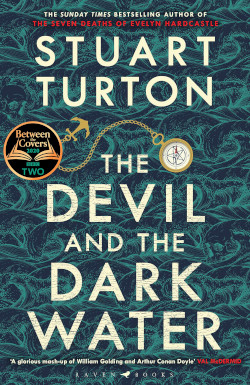
Stuart Turton, author of The Devil and the Dark Water, talks to Historia for the third in our series of interviews with authors whose books have been shortlisted for HWA Crown Awards. His novel, which is up for the Gold Crown Award, is described by the judges as “Holmes and Watson on a 17th-century Dutch East Indiaman, but Holmes is a prisoner and their opponent seems to be the devil. Superb voice, visually wonderful, with dizzying plot twists; outstanding.“
Congratulations on being shortlisted for the HWA Gold Crown Award! What does it mean to you?
It means so much! Every book I write is supposed to be a wild swing for the fences. I want to mess with genres and archetypes, and really have as much fun as I can. The problem is that I’m never certain the book will work when I’m done playing. Winning awards like this means I’m on the right track, and it gives me the confidence to keep on doing what I’m doing.
How did the idea of The Devil and the Dark Water come about?
I was travelling around Australia when I was 23, and I happened across an exhibition about the wreck of the Batavia in 1629. I immediately became obsessed with that story, and period. After I finished my first novel, I knew I wanted to write something completely different and using the wreck of the Batavia as a starting point seemed a good idea.
Everything in this period is thrilling. Seafaring was incredibly basic, which made each voyage incredibly tense. Capitalism was taking on many of the structures we understand today. Superstition was rife. The occult was practiced and feared. It just seemed a perfect setting, with plenty to unpack.
As for the plot, that came about as a reaction to the lonely detective in my first novel. For this book, I wanted to write a group of characters on an adventure, having fun. Everything spun out of that wish.
Your book is absolutely gripping, yet you’re also often playful. Which do you enjoy writing more, the dark scenes or the light?
Awww, thanks. Playfulness is my mission statement. I really want people to enjoy reading my books, but I always want to be doing something new with them. As for light and dark, I don’t really differentiate. For me the story is the story, and it all feels the same when I’m putting it down on paper. The only bits I hate are the exposition scenes. I always leave those till last.
The sense of place in The Devil and the Dark Water is compelling; I certainly felt as if I were on board a Dutch East Indiaman in the 1630s. Do you find research for a book a pleasure or a chore?
That’s lovely to hear. I do really strive to put my readers in the action. I want them to smell the spice and feel the sea spray on their skin. I enjoy the research, because I give myself leeway to enjoy it.
I travel as much as I can – for this book, I travelled to a real-life recreation of the Batavia ship, which is now a floating museum in the Netherlands. I went out to Jakarta to look at the remnants of the city it used to be.
I spent three weeks in the British Museum poring over passenger manifests and journals from that period, reading about people who’d voyaged on these ships. That was thrilling, and often terrifying. Most of the details in the book come directly from those accounts.
Did your research for The Devil and the Dark Water turn up anything unexpected?
Apparently one in three people who set sail would never return, and most of them wouldn’t survive the voyage. Imagine being that desperate for a new life that you’d risk losing your old one. I also didn’t know that sailors use to wipe their bums with rope and wash their clothes in their own urine, because they hated the itch of seawater. That would have been quite the stink after a few weeks.
Were you conscious of any modern-day parallels when writing your book?
Absolutely tons! It was terrifying to see how little we’ve changed as a society. I was writing at the height of the Trump era, and watching how he whipped up his crowds was directly analogous to some of the witchfinder tactics I encountered, and the exploitation of superstition to benefit the powerful.
The brutal capitalism of the Dutch East India Company – not to mention their company structure – isn’t too far off what multinationals employ today.
The thing that really stuck out was the willingness of people to believe harmful nonsense rather than stare directly at an uncomfortable truth. That hasn’t changed at all.
What advice would you give someone starting to write historical fiction?
I’m not really qualified to give advice. I make brand new mistakes each book I write, and miss every deadline set. I try to enjoy my work, though. And I try to ignore external pressures as much as I can.
At the end of the day – no matter who’s demanding what from you – it’s your name on the front of the book, and it always will be. I can deal with writing a bad book. That happens. But I’d be furious with myself if I wrote a bad book because I let myself be pressured into doing something I didn’t want to do.
What do you think the historical novelist can add to the study of the past?
Emotion. History is often a dry thing. A person’s suffering is simply a turn of the cog to get us onto the next incident.
Historical novelists can imagine the pain; they can make us understand that all those people who schemed, fought, and died, believed in things, or were afraid, or utterly convinced of their viewpoint. Novelists are good at feeling. History usually isn’t.
What’s next? What are you working on now?
Book three! I can’t really say more because I want every book I write to be a surprise. Not just the twists, but the timeframe, the characters, the plot – even the genre. If I had my way I’d take the blurb off the back.
The plot’s crazy. I’ll say that.
And finally, can you describe your book in five words?
Seafaring supernatural Holmes-esque murder mystery.
The Devil and the Dark Water by Stuart Turton was published by Bloomsbury on 1 October, 2020.
Stu’s first novel was the award-winning international bestseller The Seven Deaths of Evelyn Hardcastle.
This is the third in Historia’s series of interviews with authors of books shortlisted for the 2021 HWA Crown Awards.
The first was with Ellen Alpsten, who’s in the running for a Debut Crown Award. Mick Finlay, who, like Stuart, is shortlisted for the Gold Crown, was the second.
See all the HWA Crown Awards shortlists for 2021.
The winning books in all three categories will be announced at 11am on 24 November.
If you enjoyed this interview, you maybe interested in these Historia features:
All at sea in Tudor England by naval historian JD Davies, author of The Journals of Matthew Quinton and Jack Stannard of the Navy Royal.
Historia interviews, 2020 Crown Awards shortlists: Andrew Taylor
James I & VI: King or Queen? by Elizabeth Fremantle
Why the Glorious Revolution was . . . well, neither by Angus Donald
And so to bed – a goodbye to Pepys’s diary by Deborah Swift
Images:
Photograph of Stuart Turton: supplied by Bloomsbury
The Batavia, plate from the 1647 Dutch book Ongeluckige voyagie, van’t schip Batavia (Unlucky voyage of the ship Batavia), 1647: Wikimedia
View of Batavia as it was formerly under the name of Iacatra in the early 17th century: Wikimedia
Natives of Arrakan sell slaves to the Dutch East India Company, 1663: Wikipedia
Replica of the ship Batavia, Lelystad, Netherlands: Wikimedia









